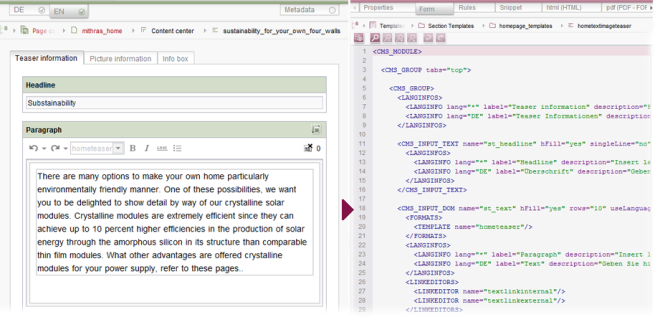Creating forms in the template wizard
Forms are an important component of many FirstSpirit templates. They provide the editor with a means of adding editorial content to pages and sections. Forms consist of input components which can accommodate editorial content and design components which can be used to visualize the input components in the forms.
In the case of regular template creation in FirstSpirit SiteArchitect, the input components and design components are edited via the “Form” tab of a template (see also the corresponding basics chapter). If the form is to be used to add formatted texts, for example, the template developer must create a corresponding input component (CMS_INPUT_DOM) in the template, configure it for the relevant application scenario, and create the presentation of the content in all template sets of the project. This process is completed for every input component that is required in the project.
Component templates
The template wizard now supports an option which simplifies this process with component templates. These component templates can be created and edited on the Settings tab.
The advantage of these component templates:
- The component templates are flexible form boilerplates which are created once and can then be reused again and again. This flexibility is achieved by merging elements from the GOM definition of the input component (e.g., <CMS_INPUT_DATE ...) with the FirstSpirit template syntax (e.g., $CMS_FOR(....)) within the template (see Creating component templates).
- The import projects in the template wizard not only enable these boilerplates to be made available as boilerplates for forms in the current project but also support use server-wide (via the function: “Import templates from project”).
Limitations of component templates
The input components of a form cannot be grouped in the template wizard. To create a group with CMS_GROUP, the template must be adapted manually following import into the FirstSpirit project.
The template wizard does not support the creation of dynamic forms either.


